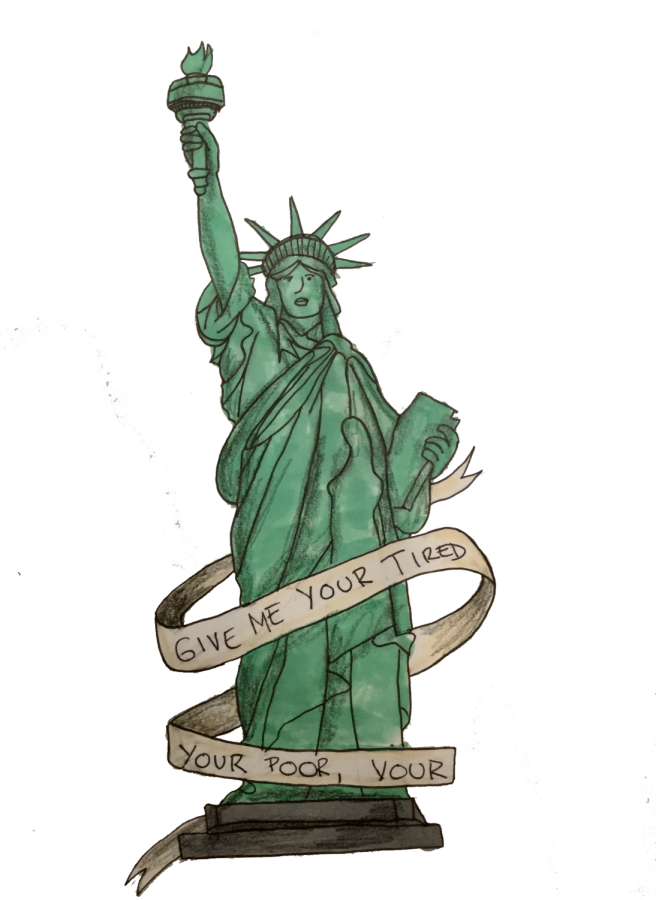To build or not to build?
Trump’s border wall raises questions of financial and ethical justifications
Despite enduring the longest government shutdown in U.S. history, one that lasted 21 days and ended on Jan. 25 when President Trump signed a short-term spending bill into law, our country has yet to see the end of arguments regarding immigration and Trump’s most controversial solution to the debate: the border wall.
In an interview on CBS “Face the Nation” on Feb. 3, Trump indicated that he will declare a national emergency on Feb. 15 to secure his requested $5.7 billion for a wall at the southern border.
The sentiments he shared parallel his words from an interview with the “New York Times” on Jan. 31 when he expressed this same determination.
The president has repeatedly asserted that a border wall serves as protection from criminals, citing human trafficking, drugs, and gangs as reasons why refugees can be detrimental to this country.
President of Trevian Republican club and junior Frank Zawarazky supports the view that illegal immigrants are a danger and financial burden to this country.
“Illegal immigrants account for 80% of the illegal drug seizures in this country. According to USA Today Oct. 10, 2018, drug trafficking arrests on the border plunged after the zero tolerance policy was implemented,” said Zawarazky.
Senior Will Thornton, a leader of a Super PAC, a type of independent political action committee, said that fears of terror and drugs and crime are not rational ones. “Federal data shows that only 1/7th of illegal immigrants actually cross the border illegally, most just overstay their visas,” said Thornton.
Funding for this wall has also become the topic of heated debates across the country, with individuals who either believe that the wall is a necessary use of our resources or a waste.
“Looking at . last year’s Pew Research, there are 10.7 million illegal immigrants in the country and that’s a conservative estimate. Over their lifetime they [each] cost us $70,000, ten times the deportation fee of $7,000. Trump’s wall is costing us $5 billion. Imagine what we could do with that $749 billion that we would get back,” said Zawarazky.
Senior Grace Guarraia, a self-professed libertarian, however, believes that resources used to build a border wall should be reallocated.
“[The wall] not only represents a certain negative mindset of the current administration, but its cost and the labor put into its construction can be put towards much more important departments and movements, such as funding education, science and research, or infrastructure improvements in our country,” said Guarraia.
The current immigration policy of the Trump administration relies heavily on deterring asylum seekers, particularly at the U.S. – Mexico border, and refusing their requests to enter the U.S.
Zawarazky supports the increase in border patrol, and believes border patrol are under fire by the media these days.
“When you have people saying that we should abolish Immigration Customs and Enforcement that’s ridiculous. A country is not a country without borders,” said Zawarazky.
On the other hand, Thornton considers Trump’s immigration policy a blatant misunderstanding of “immigration, economics, and Latin American politics.”
“What I disagree with most about Trump’s current immigration policy is just how far from reality the whole idea is. Who are we to tell desperate people who are fleeing war-torn countries that we helped destroy to go back home, that the third largest country in the world is full, that we have no want or need for their hard work and dedication. It’s nonsense,” said Thornton.
Guarraia agrees that the ways our country has treated immigrants seeking asylum in the U.S. has been egregious.
“Immigration is a challenging problem, and I strongly believe that our country’s jobs should be in the hands of legal citizens. Yet at the same time, it is awful to see how immigrants, especially from Central and South American countries, are being treated as almost subhuman as they attempt to enter our country,” said Guarraia.
Thornton believes this controversy can be attributed to the contemporary negative connotations associated with immigration.
“Legal immigration for most of US history consisted of simply walking off of a boat or crossing an imaginary line. The fact that our answer to illegal immigration now is to just build a wall on the southern border is ludicrous. If people want to come they will find a way to come. If you want to stop them, you should at least think of something a little more original than a fence,” said Thornton.






































